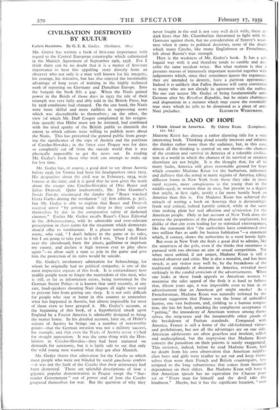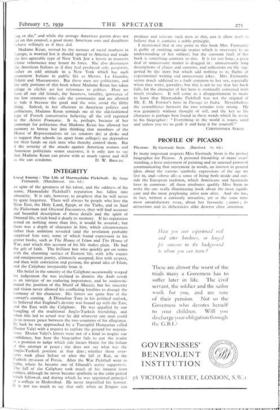LAND OF HOPE MADAME KEUN has chosen a rather alarming
title for a very interesting book. Thinking aloud usually interests and informs the thinker rather more than the audience, but, in this case, almost all the thinking is centred on one theme—the chances of the creation and survival in America of a tolerable civilisa- tion in a world in which the chances of its survival or creation elsewhere are not bright. It is the thought that, for all its many faults, America still gives reasonable ground for hope which consoles Madame Keun for the barbarism, indecency and dullness that she noted in many regions of America, taking different forms in New York from those they take in more rural regions, more conspicuous in the young than in the middle-aged, in women than in men, but present to a degree that might, at first sight, justify a far more hostile book on America than this is. For Madame Keun has achieved the miracle of writing a book on America that is devastatingly frank and critical, indeed harshly critical, while at the same time making plain her real affection and admiration for the American people. Only in her account of New York does she reverse the proportions of the pleasant and the unpleasant, her dislike of that city even leading her to statistical extravagances, like the statement that " the authorities have condemned over two million flats as unfit for human habitation "—a statement which, if correct, shows the authorities in a most heroic light.
But even in New York she finds a good deal to admire, like the smartness of the girls, even if she thinks that smartness is pursued with too obvious an aim of sexual competition. Yet when most unkind, if not unjust, Madame Keun is still a shrewd observer and critic. She is also a moralist, and has been struck, as any visitor may well be, by the breakdown of the traditional standards of decorum in America, revealed most strikingly in the candid eroticism of the advertisements. When one looks at these frank appeals to American women to maximise the sales appeal of the flesh it is hard to believe that, fifteen years ago, it was impossible even to hint in an advertisement that an American girl might smoke! As a Frenchwoman, Madame Keun was naturally irritated by the constant suggestion that France was the home of unbridled license, one vast bedroom, and, yielding to a human tempta- tion, she has hit back, attacking the complacent acceptance of " petting," the immodesty of American women among them- selves, the strip-tease and the innumerable other proofs of the breakdown of Puritan standards. Compared with America, France is still a home of the old-fashioned virtues and prohibitions, but not all the advantages are on one side. American adolescents are often graceless and insolent, selfish and undisciplined, but the impression that Madame Keun conveys the parasitism on their parents is surely exaggerated. This reviewer, indeed, before he read Madame Keun, had no doubt from his own observation that American middle- class boys and girls were readier to get out and keep them- selves than were their French and British counterparts, less resigned to the long subservience that comes from financial dependence on their elders. But Madame Keun will have it that American speech has no equivalent for Chacun pour soi or " Every man for himself and the devil take the hindmost." Maybe, but it has the significant locution, " root jog or die," and while the average American parent does not .:ct on this counsel, a good many American sons and daughters "ehave willingly as if they did.
Madame Keun, moved by the menace of racial madness in It.urope, is worried lest it should spread to America and reads the less agreeable type of New York Jew a lesson in manners whose vehemence may lessen its force. She also denounces :he American Italians as if they had produced only gangsters, tither an odd attitude in a New York which has such prominent Italians in public life as Messrs. La Guardia, Poletti and Marcantonio. But these men are politicians, and Ihe only portions of this book where Madame Keun has taken refuge in clichés are her references to politics. Here we have all our old friends, the baseness, venality, ignorance of he low creatures who rule the community and are allowed to rule it because the good and the wise avoid the filthy thing. Indeed, in her allusions to American politics and politicians, Madame Keun reminds me of the old-fashioned type of French conservative believing all the evil reported in the Action Francaise. It is, perhaps, because of her contempt for politicians that Madame Keun has allowed her memory to betray her into thinking that members of the House of Representatives sit (as senators do) at desks and to suggest that schools (as apart from colleges) are dependent for their funds on rich men who thereby control them. But if the severity of the attacks against American women and American politicians seems excessive, it is only just to say that Madame Keun can praise with as much vigour and skill











































 Previous page
Previous page